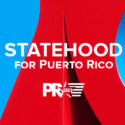Darren Soto and Jenniffer Gonzalez Colon wrote a simple explanation of Puerto Rico’s status that everyone should read.
“The reasons for Puerto Rico statehood are simple and compelling,” they wrote. “A majority of Puerto Rican voters yet again chose statehood in November 2020. The ballot was a clear ‘yes or no’ question in a high-turnout general election. They cast their vote after suffering through a long recession, deadly hurricanes, powerful earthquakes, fiscal board budget cuts and now COVID-19. Many believe that two U.S. senators and four U.S. representatives will help them greatly in resolving these crises.”
Providing equal rights and full citizenship for 3.2 million U.S. citizens living in Puerto Rico after more than 120 years should not be a tough concept, and it isn’t.
But, as Soto and Gonzalez-Colon wrote after their first paragraph explaining statehood, the opposition to statehood is less clear. There are two sources of opposition to statehood.
Enhanced commonwealth
“First, there is the fictional concept of an ‘enhanced commonwealth.’ This ‘having it all without paying for it’ option is promoted as an upgrade to the current status but is found nowhere in our Constitution,” Soto and Gonzalez-Colon explained. “It presumes Puerto Rico can get all the benefits of a state without ever becoming one. Of course, the federal government will never agree to such chicanery.”
Every single branch of the federal government has in fact said that it will not agree to this idea.
There are some people in Puerto Rico who still believe in the fantasy of “enhanced commonwealth.” They cannot define it or describe it, because it is something they believe can be negotiated, perhaps by a congressional commission or delegates at a status convention, at some point in the future.
Independence
“The peak of hypocrisy, this movement is predominantly supported by Puerto Ricans living stateside,” Soto and Gonzalez-Colon point out. “Many in the Puerto Rican diaspora have forgotten the realities of an island that does not enjoy the full advantages of the states where past generations have settled. They disguise their stalling tactics in attention-grabbing and misleading phrases like ‘self-determination’ or ‘considering all options.’ They confuse and muddy the issue, hoping that most Puerto Rican voters will one day change their minds. They won’t. The vast majority of Puerto Ricans prize their American citizenship, serve in the military in higher percentages than most states and enjoy a quality of life boosted by billions in federal funding.”
Independence is supported by a tiny percentage of Puerto Ricans. Congress could force Puerto Rico to become independent, but that is unlikely.
Some Puerto Rican communities in the states were settled by people from Puerto Rico who favored independence. They felt that they were not free to express their beliefs in Puerto Rico. Now, they and their children or grandchildren have a romantic attachment to the idea of independence which ignores the fact that people actually living in Puerto Rico simply do not want independence.
Congress can force independence on Puerto Rico legally, but nobody else can. Independence for Puerto Rico is as much of a fantasy as enhanced commonwealth.
Statehood
“Election after election has proven a clear consensus: It is time to right the historic wrong of colonialism by paving the way for Puerto Ricans to enjoy the full rights of their U.S. citizenship and gain the representation they deserve. Statehood is ultimately the best, most likely option,” say Soto and Gonzalez-Colon. “The bipartisan Puerto Rico Statehood Admissions Act would bring that option to fruition. Delay tactics like Status Conventions only doom Puerto Rico to more endless debates, minority rule and another generation of second-class citizens living under a failed territorial status.”
There are still just three options for Puerto Rico’s status under the U.S. Constitution:
- territory
- independent nation
- state
“Enhanced commonwealth” essentially means continuing as a territory, since the Constitution does not allow this imaginary relationship. Puerto Rico has rejected the current territorial relationship. Independence is possible, but Puerto Rico does not want it. Statehood is the only true option.
Tell your legislators that it is time to admit Puerto Rico as a state.








One response
PUERTO RICO FOR STATE